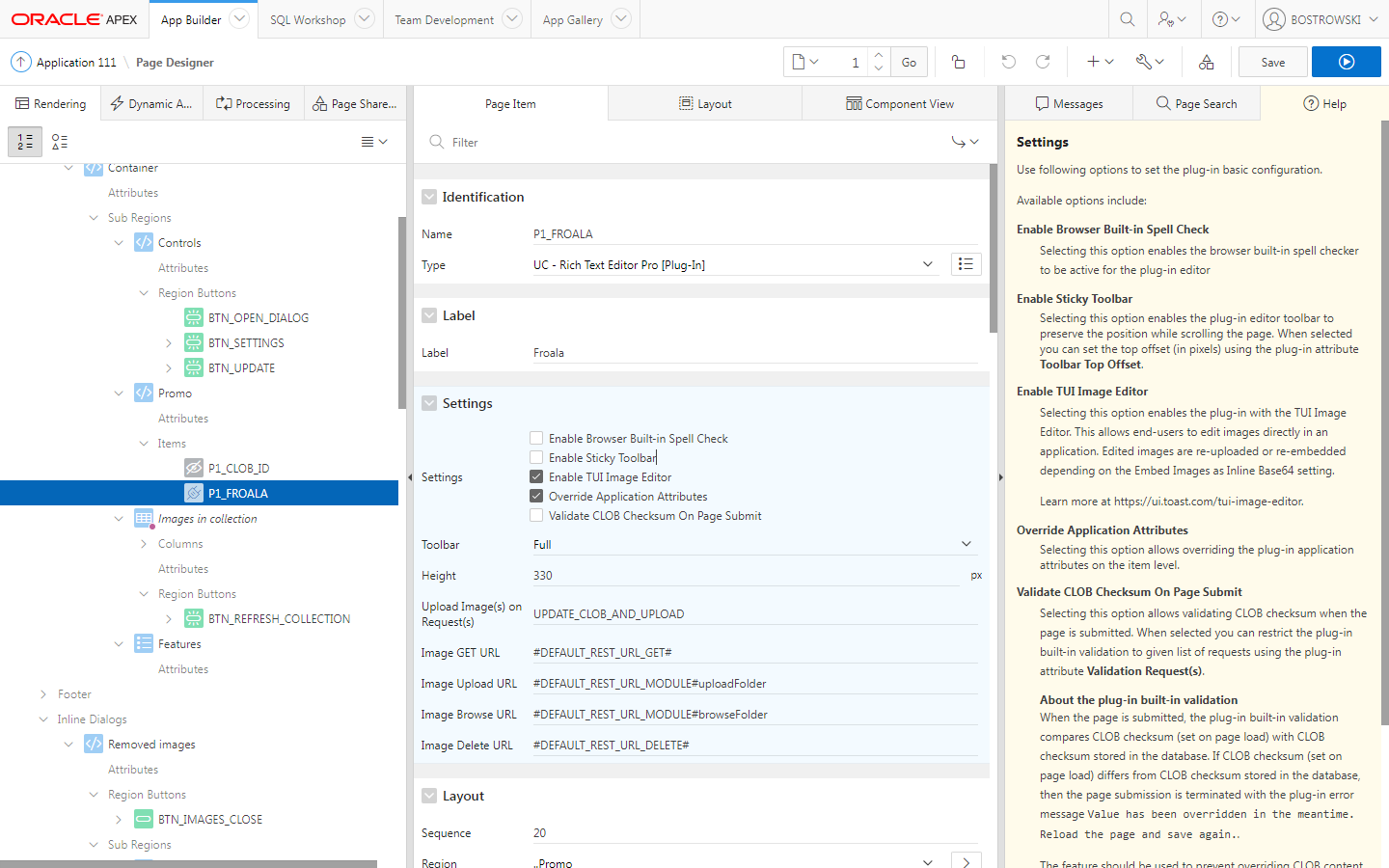Oracle APEX integration
The plug-in integrates with Oracle APEX using the JavaScript API and page designer item attributes.
Debug mode
When Oracle APEX debug mode is enabled, the plug-in:
- produces browser console logs (Oracle APEX debug levels are used)
- produces PL/SQL logs available in APEX View Debug
Dynamic Actions
The table below presents supported native Oracle APEX dynamic actions.
| Dynamic Action | Description |
|---|---|
| Set value | Sets a new rich text value. The plug-in respects the Suppress Change Event flag. |
| Clear | Resets rich text HTML to empty value. Triggers change event. |
| Disable | Disables the Froala editor. |
| Enable | Enables the Froala editor. |
| Hide | Hides the Froala editor. |
| Show | Shows the Froala editor. |
| Refresh | Fetches the draft CLOB value from the session state and replaces the current rich text HTML. |
| Set Focus | Sets focus on the Froala editor. |
Help in the Page Designer
The plug-in attributes are available in the page designer with built-in Help. Built-in help is only the supporting documentation available in the page designer and only describes some of the plug-in features.

Native JavaScript API
The table below presents the supported native Oracle APEX JavaScript API.
| API | Description |
|---|---|
apex.item.getValue | Returns the current value (HTML) of the Froala editor |
apex.item.addValue | Adds the value to the Froala editor |
Native JavaScript events
The plug-in is listening and triggering Oracle APEX native JavaScript events.
Change
The plug-in triggers a native change event (change) without additional event data.
The event is triggered when:
- dynamic action Refresh on item implementing the plug-in is finished
- the end-user leaves the editor after modifying rich HTML text
- native APEX JavaScript API
apex.item.addValueis executed
Before Refresh
The plug-in triggers a native before refresh event (apexbeforerefresh) before an item is refreshed. The plug-in extends the native event with extra data indicating whether an item refresh event is triggered by the native Refresh dynamic action or is triggered by the supporting dynamic action plug-in (Reset value).
The event is triggered along with the data described below.
| Property | Type | Description |
|---|---|---|
this.data.reason | Text | Indicates what action triggered the event. |
The this.data.reason might be set to the following values:
froalaresetclob- an item is refreshed by the supporting plug-inapexdarefresh- an item is refreshed by the native Refresh dynamic action
After Refresh
The plug-in triggers a native after refresh event (apexafterrefresh) after an item is refreshed. The event is triggered along with the plug-in data indicating whether an item was refreshed by the native Refresh dynamic action or was triggered by the supporting dynamic action plug-in (Reset value).
The event is triggered along with the data described below.
| Property | Type | Description |
|---|---|---|
this.data.reason | Text | Indicates what action triggered the event. |
The this.data.reason might be set to the following values:
froalaresetclob- an item is refreshed by the supporting plug-inapexdarefresh- an item is refreshed by the native Refresh dynamic action
Translation Messages
The plug-in supports the following Oracle APEX Text Messages. The translation Text message must be defined in an application, and it has to have the attribute Used in JavaScript enabled.
| Translation Code | Translation default text |
|---|---|
| UC_CONFIRM_UPLOAD_PENDING | File(s) are not yet uploaded. Do you want to continue? |
Validation
The plug-in supports HTML5 validation using an item attribute Validation and PL/SQL validation checking if rich text HTML is empty. Additionally, the plug-in has built-in validation checking if the currently edited CLOB value has been changed before submitting a page.
Understanding CLOB checksum validation
When the page is submitted, the built-in plug-in validation compares the on-load CLOB checksum with the CLOB checksum currently stored in the database. If checksums don't match, the page submission is terminated with error message:
Value has been overridden in the meantime. Reload the page and save it again
The purpose of this feature is the following:
- prevent two different end-users from saving their changes to the same CLOB stored in the database,
- prevent one end-user from saving different changes done in multiple browser tabs on the same CLOB.
A developer can enable CLOB checksum validation using the plug-in page item attribute Validation Request(s).
By the default the plug-in uses APEX hidden items named
f01to store page itemsCLOBchecksums. A page item checksum can be stored in a custom page item - just create a new page item named{PX_PAGE_ITEM}_CHECKSUM, where{PX_PAGE_ITEM}is page item implementing the plug-in.